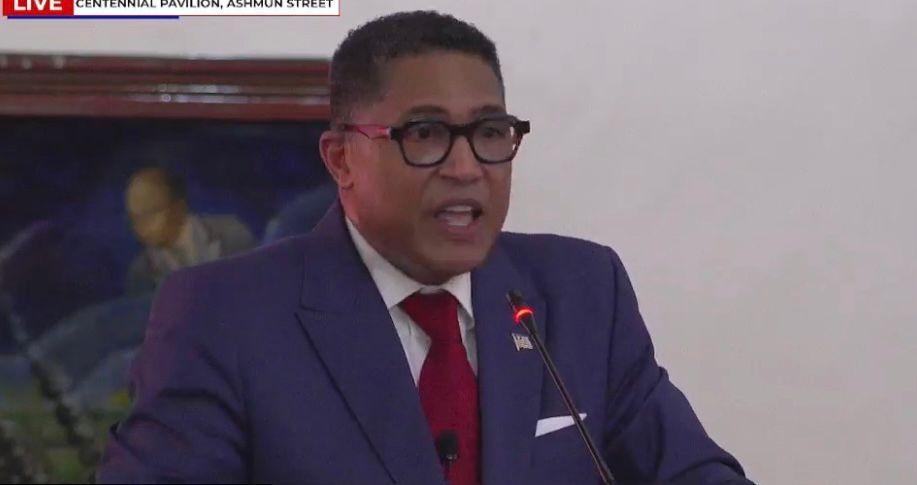Africa-Press – Liberia. The National Independence Day Orator, Rev. Emmett Dunn, delivered thought-provoking message on July 26, reminding Liberia’s leaders and citizens alike that the task of building a better nation cannot be shouldered by one man alone.
In his speech, Dunn said the fight against corruption must be embraced by the entire government, not just the President.
“To the Honorable Speaker, the Honorable President Pro Tempore, and Her Honor,” Dunn stated, “the fight against corruption is yours as well—not just the President’s.”
The orator’s address echoed loudly inside the Centennial Pavilion, where members of all three branches of government had gathered for the official Independence Day program.
Dunn, a Liberian diplomat and regional leader of the YMCA in Africa, used his platform to highlight a range of pressing national issues—from corruption and unemployment to gender inequality and national reconciliation.
He called on national leaders to listen carefully to what the Liberian people—especially the youth—are saying.
“There’s a parable,” he said, “that says, when one enters a village, they should listen to the songs the children sing. For by listening to the songs the children sing, you will hear the good, the bad, and the ugly.”
And what are the children singing? Dunn answered: they are singing about corruption that remains deeply rooted in public institutions, about joblessness that has pushed many into despair, and about the widening economic gap where the poor struggle to survive while a few continue to prosper from privilege.
Shared Responsibility, Not Blame
Dunn pushed back against the narrative that places the burden of reform solely on the President. While acknowledging the high expectations placed on President Joseph Boakai, he stressed that meaningful change requires the active participation of every institution and every citizen.
“It will take more than policy to uproot corruption,” he said. “It will take courage and political will from the highest office to the lowest.”
The statement was a direct challenge to the Legislature, judiciary, and public sector leadership to rise above rhetoric and commit to integrity-driven governance.
A Nation Still in Pain
Transitioning from governance to social issues, Dunn acknowledged that Liberia still bears deep wounds—wounds caused by tribalism, exclusion, injustice, and gender-based violence. He said Liberia’s future depends on a bold, nationwide process of reconciliation.
“Reconciliation is an ongoing process,” he noted, while proposing the creation of a Standing National Commission on Reconciliation—a nonpartisan, inclusive body that would promote historical truth-telling, civic education, and healing from community to community.
Dunn warned that ignoring Liberia’s painful past in the name of moving forward only delays healing and national unity.
“The War Is Over”—A Call to Let Go of Excuses
In a moment that drew wide applause, Dunn declared: “The war is over. News flash—fresh off the press—the war is over!”
He criticized the tendency of some leaders to use the civil war as an excuse for inaction and poor governance. According to him, survival is no longer enough—Liberians must now turn their attention to transformation.
“Stop using the war as a crutch,” he said. “If we continue to hold on to the past, we stifle the birth of possibilities.”
From Despair to Determination
Despite painting a sober picture of Liberia’s current challenges, Dunn emphasized that these are not reasons for despair but rather reasons to act. He called on young people to be job creators, not just job seekers. He urged leaders to lead not just for power, but for service. He encouraged communities to build bridges, not walls.
“Let us not only demand change, but let us be committed to be the change that we demand,” Dunn urged. “The Liberian dream must be built by Liberian hands.”
Rev. Dunn said the future is not a gift, but a responsibility. Nation-building, he said, is not the job of one man, one party, or one group. It is a collective task that calls for integrity, unity, and sacrifice.
“Because the work of building Liberia,” Dunn declared, “is not limited to the Executive Mansion—it involves all of us.”
For More News And Analysis About Liberia Follow Africa-Press






